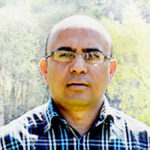Mechanistic Crop Modeling and Life-Cycle Assessment Modeling Workshops
-

February 21, 2018-February 22, 2018
Gainesville, FL, USA
Two workshops for the Climate Adaptation and Mitigation in Fruit and Vegetable Supply Chains project were held at the University of Florida in Gainesville. Workshop participants included scientists and extension specialists from the Agriculture & Food Systems Institute, University of Florida, University of Arkansas, Washington State University, and World Agricultural Economic and Environmental Services.
Integration of Mechanistic Crop & LCA Modeling
Wednesday, February 21, 2018
One of the project’s unique aspects is the integration of mechanistic crop modeling with life-cycle assessment (LCA) modeling. This day-long workshop provided an opportunity for participants from both the mechanistic crop modeling and LCA modeling teams to identify and harmonize specific data items across the models. Action items that required post workshop follow-up were identified, and a summary of workshop outcomes was prepared and shared with the full project team.
Agenda
Overview of LCA Modeling and Data Needs from Mechanistic Crop Models
Presenters: Dr. Greg Thoma and Dr. Ranjan Parajuli
Overview of Mechanistic Crop Modeling and Outputs
Presenter: Dr. Claudio Stöckle
Overview of Mechanistic Crop Modeling and Outputs
Presenters: Dr. Senthold Asseng, Dr. Gerrit Hoogenboom, and Dr. Chuang Zhao
Discussion Session: Units
Discussion Session: Can LCA Modeling Outputs be used by Mechanistic Crop Models?
Discussion Session: Next Steps
Identification of Data Sources for LCA Modeling
Thursday, February 22, 2018
The development of comprehensive LCA models across entire supply chains for the project’s target crops (potatoes, tomatoes, oranges, green beans, strawberries, sweet corn, carrots, and spinach) is essential to the project. This required the identification of data sources describing all key processes throughout the various supply chains. This day-long workshop provided an opportunity for the LCA modeling team to meet with supply chain experts in person. In addition to identifying necessary data sources, other beneficial outcomes included: (1) creating broad regional awareness about the project; (2) receiving broad stakeholder input; (3) connecting with other researchers already conducting relevant work on this topic; and (4) establishing a regional stakeholder community for future engagement.
Agenda
Overview of Project
Presenter: Dr. Dave Gustafson
Presentations: Position, Background, and Expertise with Project Crops
Presenters: Extension Specialists and Unit Administrators invited by the Extension Team
General Overview of LCA Modeling and Data Needs for Crop Models
Presenters: Dr. Greg Thoma and Dr. Ranjan Parajuli
Discussion Session: How to Obtain Necessary Data
Discussion Leaders: Dr. Greg Thoma and Dr. Ranjan Parajuli
Hands-on Session: Data Transfer into LCA models
Discussion Session: Next Steps
Participants from the Project

Dr. Senthold Asseng
University of Florida, Gainesville
Dr. Dave Gustafson
Agriculture & Food Systems Institute
Dr. Gerrit Hoogenboom
University of Florida, Gainesville
Dr. John Kruse
World Agricultural Economic and Environmental Services
Dr. Kati Migliaccio
University of Florida, Gainesville
Dr. Ranjan Parajuli
University of Arkansas
Dr. Claudio Stöckle
Washington State University
Dr. Greg Thoma
University of Arkansas
